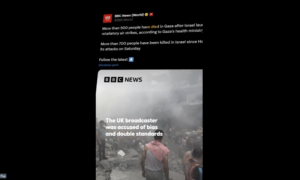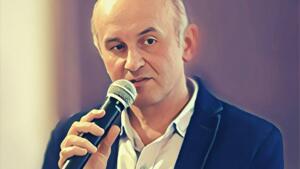The story of Pfizer’s CEO raises many key questions. How many great minds like Abraham Bourla were claimed in World War II? How many inventors, discoverers, people of science gave their lives because of someone’s unjustified hatred? And finally – how many people who would change the face of the world die every day in armed conflicts in Syria, Turkey or Yemen?
Pfizer – an American pharmaceutical company, which, due to the invention of the vaccine long-awaited by the whole world, seems to be on the spotlight. The power of the New York giant is evidenced by the numbers: over 53 billion dollars in revenue in 2018 alone, 177 million searches on Google, about 100,000 employed specialists.
The questions are who is at the top of this powerful medical machine? What’s its story? And what is less obvious: what is the connection between Pfizer’s vaccine and… the Holocaust?
By a hair’s breadth
Early 1939. Thessaloniki, Greece. The picturesque coastal town is inhabited by about 60,000 Jews. They are recognized by the local population as a valued and peaceful community. In addition to praying, they mainly work in the port – the most popular activities include fishing and trading with foreigners landing on shore. Everyday life passes extremely quietly. There is no indication that in just the next few years someone will want to take the lives of over 97% of them.
The idyll is interrupted by the outbreak of World War II. From that day on, the Jews of Thessaloniki were hearing more and more rumors about ethnic cleansing, successively carried out by Hitler’s Nazi followers. There is an atmosphere of fear and misunderstanding in the town. The bloody end comes only on April 6, 1941, when German troops, preparing for the famous invasion of the Soviet Union, occupy the Greek coast. “The Second Jerusalem,” as Thessaloniki Jews used to call it, ends up under German occupation. In just 4 years, more than 50,000 people will suffer a terrible death in concentration camps.
One of the few surviving families will turn out to be the Bourla family, which will give birth to their son, Abraham, 16 years after the end of the war.

The American dream of a young scientist
Young Bourla turned out to be a bright and hardworking boy. Without abandoning his native lands, he graduated with honors from veterinary medicine at the Aristotle University of Thessaloniki, where he then earned a doctorate in biological sciences. In 1993, he started working in the Greek branch of Pfizer – initially as a doctor of veterinary medicine. A few years later 40-year-old Abraham decided to leave the Greek coast and took a chance at the American pharmaceutical industry. Remaining faithful to his current employer, he accepted a job in the Animal Health division of Pfizer.
The young scientist started his American dream by changing his name – he welcomed cloudy New York mornings as Albert Bourla. However, the weather seemed to be the only unfavorable thing for him, because in every other field he was accompanied by continuous success.
In 2005, he was appointed Principal Manager of Pfizer’s European, African and Middle Eastern branches. The coming years brought further promotions and so, in February 2019 he was elected the new president of the company. Nobody expected that later in the same year, the whole world would hold its breath for a moment and Albert’s work would be needed as never before.
Pfizer to save humanity
Early in 2020, the SARS-CoV-2 virus rules the world. In the face of the death of millions, more and more governments, due to their obvious helplessness, decide to implement the “stay at home” policy. We need a vaccine for now. All hope remains in science.
“The potential gains are irrelevant to the vaccine,” Albert Bourla told his colleagues shortly after he announced that he would begin research into a novel method of combating the virus. Although the first successful research on the use of messenger RNA was carried out in the 1990s, the creation and use of a vaccine based on this technology was to be the first such event in history. Therefore, the president of the American giant took a considerable risk, deciding to additionally cooperate with the German company BioNTech before receiving the official approval of the American Food and Drug Administration.
Bourla went out on a limb. Finally succeeded – On December 10, 2020, the results of a groundbreaking Phase III trial of the COVID-19 vaccine are published in the New England Journal of Medicine. Efficiency estimated at 95% seems like an unimaginable success. The determination and effort made by the Greek have paid off, and thanks to his efforts the world has quite a real chance for a better tomorrow.
Not only Bourla
The CEO of Pfizer was not the only migrant eagerly involved in producing a cure for the new virus. Also noteworthy is the marriage of doctors: Uğur Şahin and Özlem Türec. They both come from Turkey, and in their work they focus on studying the immunology of the human body. They are real enthusiasts – they even visited the laboratory on their wedding day.

The fruit of their love is the German biopharmaceutical company BioNTech, founded in 2018, which deals with the development of methods of fighting cancer on a daily basis. As part of it, the couple decided to cooperate with the American concern Pfizer. This combination of forces enabled the world to obtain a long-awaited cure – a modern mRNA vaccine.
What does the story of Albert Bourla teach us?
The story of Pfizer’s CEO raises many key questions. How many great minds like Abraham Bourla were claimed in World War II? How many inventors, discoverers, people of science gave their lives because of someone’s unjustified hatred? And finally – how many people who would change the face of the world die every day in armed conflicts in Syria, Turkey or Yemen?
It was so close that Albert Bourla would never be born. One more round-up, one more order given, one wrong decision of his parents would have been enough. There would be no childhood on the Greek coast, no veterinary medicine, and perhaps not even the Pfizer vaccine. The world was so little from not producing a cure that would undoubtedly change its fortunes. And it’s all because of the war, consuming more innocent lives.
This is a story that should always be in the back of our minds when we read about conflicts in the Middle East. When we hear how many children have died today in Kabul, Afghanistan. When we see photos of bombed bodies, attached to another fundraiser for humanitarian aid. For some, the war never ended.
Author: Kinga Kubacka – law student, writer, bookstagramer (check out @k2backa on Instagram >>>). She deals with public international law and human rights issues. Member of Salam Lab team.
Translation: Anna Słania – national and international security expert, journalist. Interested in the issues of contemporary armed conflicts, terrorism and humanitarianism in international relations. Works in the field of peace journalism. Member of the Salam Lab team.
Sources:
[1] The National Herald, Pfizer Chairman & CEO Albert Bourla Shares His Family’s Story of Survival,
[2] Philip Chrysopoulos, A Greek to Save the World: Who is Pfizer CEO, Albert Boulra?,
[3] Chris Dall, CEO says Pfizer won’t cut corners in COVID vaccine race,
[4] The Jewish Voice, Holocaust Survivor’s Son Now Saves Those Who Killed His Own; the Remarkable Story of Albert Bourla,
[5] Museum of Jewish Heritage, Legacies: Pfizer CEO Albert Bourla,
[6] Pfizer CEO Dr. Albert Bourla on His Family Story and Jewish Roots, Youtube.
Cover photo: Albert Bourla. Credit: World Economic Forum via flickr.com (CC BY-NC-SA 2.0).



